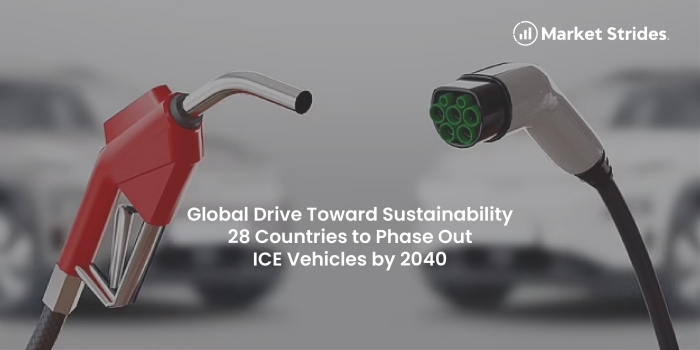Global Drive Toward Sustainability: 28 Countries to Phase Out ICE Vehicles by 2040

The World is Moving On from Gasoline: 28 Countries Plan to Phase Out ICE Vehicles by 2040
Electric cars used to feel like something you’d only see in a sci-fi movie or a Silicon Valley garage. Now? They're in parking lots, highways, and even your neighbor’s driveway. This isn’t just about trends it’s part of a bigger push.
Today, 28 countries have committed to phasing out the sale of new internal combustion engine (ICE) vehicles by 2040. That’s a massive step and while there’s still a long way to go, it says something big: the world is starting to turn the page on fossil-fueled cars.
From Gas Guzzlers to Silent Streets
For over a century, gas and diesel cars have been the standard. They gave people freedom, mobility, and in many ways, shaped modern cities. But let’s face it they’ve also contributed heavily to pollution and climate issues.
Governments have started waking up to the fact that something has to give. Air quality in many cities is poor. Fuel prices go up and down with geopolitical shifts. And climate targets can’t be hit unless the way we move changes too.
So now, from Europe to Asia and Africa to the Americas, countries are setting firm goals: No more new petrol or diesel car sales beyond 2040. Some even plan to beat that 2035, 2030, or even sooner.
Why 2040, Though?
You might think 2040 is far off. But in the car industry, it's really not. Automakers plan vehicle generations years in advance, and it takes time to shift entire supply chains. So setting a 2040 target gives companies time to adjust and consumers too.
Some countries, like Norway and the UK, aren’t even waiting that long. They're going full electric much sooner. Others are testing the waters, setting intermediate goals, or focusing on buses and commercial fleets first.
What matters most is the direction and the direction is clear.
It’s Not Just About Cars
The phaseout doesn’t stop at private vehicles. A lot of countries are including buses, trucks, and delivery vans in their plans. Some are even encouraging electric two-wheelers like scooters and motorcycles.
Cities with chronic smog problems are especially motivated. Cleaner vehicles mean better air, fewer hospital visits, and a healthier population. In places where people are literally choking on exhaust fumes, that makes a real difference.
Some governments are also doing this to cut fuel imports, saving money and boosting local industries instead.
Countries Taking the Lead
It’s not just the usual suspects anymore. Sure, countries like Germany, the UK, Canada, and Japan are leading but others are stepping up too.
Several African and Latin American nations have joined in. Some are banning ICE vehicle imports, while others are offering incentives for electric vehicle (EV) adoption.
Even developing countries are starting to plan for a transition. They’re thinking long term and not waiting for someone else to solve the problem.
Each country has its own approach. Some focus on building charging infrastructure. Others are subsidizing EV purchases or supporting local EV manufacturing. It's not one-size-fits-all, but the end goal is pretty similar.
Tech Has Come a Long Way
Let’s be real electric cars used to kinda suck. They were expensive. The batteries ran out quick. Charging was a hassle.
But that’s not the case anymore. Battery prices have dropped a lot. Most new EVs go 400–500 kilometers on a charge. And charging stations? They're way more common now. Even some gas stations have fast chargers these days.
Big automakers are going all-in. Ford, VW, Tesla, Hyundai they’re not waiting around. They're investing billions into new EV lines and battery plants.
And people are buying. Not just tech geeks normal folks who just want to save money on fuel or care about the environment.
Challenges? Sure.
Let’s not sugarcoat it there’s still work to do.
Charging networks aren’t perfect everywhere. Some regions still don’t have enough electricity to support mass EV adoption. And batteries rely on rare minerals, which brings up mining and supply chain concerns.
Also, EVs can still be pricey for lower-income families. Governments will need to step in with subsidies, used EV markets, and better public transit options to make the shift fair for everyone.
But despite all that, momentum is real. And it’s growing.
A Future That’s Already Started
You don’t have to wait until 2040 to see change. It’s happening right now.
EVs are showing up in Uber fleets, rental car companies, and family garages. Cities are installing chargers on streetlights. Governments are offering tax breaks and even cash for trading in old gas cars.
And regular people teachers, delivery drivers, parents are making the switch. Not just because it’s green, but because it makes sense.
Wrapping It Up
The idea of a world without petrol cars once felt impossible. But today, it's becoming more of a question of when, not if.
With 28 countries on board and more considering it, the ICE phaseout by 2040 is more than a target it’s a turning point. One that’s changing how we move, how we think, and how we care for the planet.
Sure, the road ahead isn’t perfect. There’ll be bumps. But one thing’s for sure we’re not going in reverse.